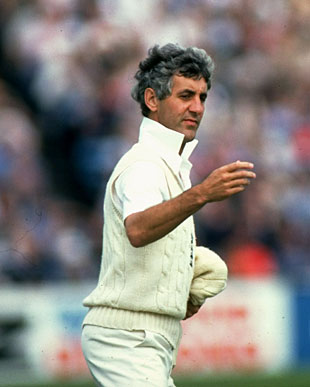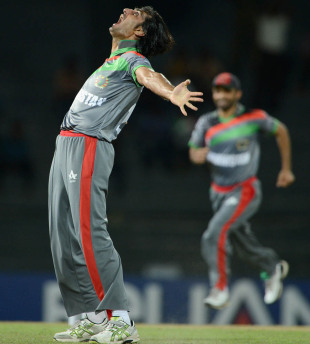A sportsman
in the zone, like an artist, has both a wider and a narrower focus. He
has the ability to be in the game and yet stand above it, seeing it
clearly
Ed Smith
December 16, 2012
Text size: A | A

|
|||
Mike Brearley,
the former England and Middlesex captain, recently gave a talk about
"the zone". Before cricket, Mike was an academic philosopher; after
cricket, he became a psychoanalyst. Taken as a whole, professional sport
is a relatively small proportion of Mike's career. But it afforded him
an intense period of practical absorption and experience. Looking back
on three careers spread over one varied life, Mike spoke to an audience at the London School of Economics about what cricket had taught him about concentration, technique and freedom.
Sometimes the best way to define something is to describe its
antithesis. "The zone" can be a slippery concept. But we all know what bad
form feels like. Brearley began with a memorable description of a
player in crisis: "We try to focus on all sorts of things that should be
unconscious - like the centipede, who, trying to think about each leg
before it moves, ends up on its back on a ditch."
"The zone" is the opposite. When we are in the zone, there is a sense of
effortlessness, your body acting as though it does not require
instructions from the mind. Many batsmen have written about the zone,
but this was the first time I've heard anyone describe "captaincy in the
zone".
It was 1982 and Brearley was captaining Middlesex against
Nottinghamshire. It was a bouncy pitch, and he was trying to think of a
way to dismiss the opposition star player, Clive Rice. Brearley not only
sensed there was a chance of Rice misjudging the bounce - many captains
would have done that - he also began to imagine as though he, Brearley,
was in fact the batsman.
In Brearley's phrase, "Here I felt my way into Rice's body and the shape
of the shot. I sensed there might be a thick outside edge, and I
pictured the ball flying to a deep wide slip, perhaps 20 yards back. I
put Clive Radley in this position, and shortly afterwards it went
straight to him at catching height. When something similar happened in
the second innings, this time on the leg side, Rice thought there was
something magical about my captaincy; in fact, it was a mixture of
bodily intuition laced with a great deal of luck."
Brearley is describing something rarely discussed in a sporting context:
the practical value of imagination. It transcended merely "visualising"
a probable outcome. Brearley used his imagination, as a novelist might,
to bring to life a very unlikely potential scenario. "Many years
later," he added, "I saw a film of Bushmen hunting a deer on foot. As
they followed the tracks of the deer in the stony ground, the hunters
'became' the deer, using the identification to find the faint footprints
in the ground; they shaped themselves into the way of moving and likely
course of the deer."
It is a rare perspective. We hear a lot about plans, very little about
imagination; much about strategy, little about adaptiveness. Brearley's
point is that a captain has to balance conscious planning with
imaginative hunches.
A team can also enter "the zone", just as a single player does. Brearley
explained what happens when a team is "hot": "Each player breathes in
the others at their best, is strengthened by that identification, and
gives off similar vibes to the rest of the team."
Note how the positivity becomes self-perpetuating, even contagious. That
is why good teams always have a strong core of senior players: this
core takes the weaker "waverers" with them on the journey towards
self-belief. Thus the team - rather than being just a list of
individuals - becomes an organic entity in its own right. One of the
truest phrases about good teams is that they become "more than the sum
of their parts".
What of the individual? One of the thrilling aspects of watching a
player in the zone - and I am thinking more of football and rugby than
cricket - is the sense that he is both aware of the whole pitch and yet
totally absorbed in the small details; he is ahead of the game, yet also
living in the here and now.
I once had a memorable conversation with the film director Stephen
Frears about the French footballer Zinedine Zidane. Frears saw parallels
between a football playmaker in full flow and a film-maker in the zone.
"What I really admire - and you see it particularly in players who are
just past their prime - is the feeling that what they have lost
physically they make up for by seeing the whole picture. They grasp the
shape of the game. They can somehow stand above it and see it clearly."
Brearley calls this "seeing the wood and the trees: he looks and takes
in the detail; but he also looks with a broader gaze, in a way that
allows unconscious ideas and connections to flow". The sportsman in the
zone, like the artist, has both a wider and a narrower focus.
This sounds very abstract. What does it feel like in more practical
terms? I would say I felt fully "in the zone" only a few times in my
career. One day, when I made 149 for Kent in about a session and a half,
stands out. And, looking back on it, there was that sense of both
narrower and wider focus. I remember being aware of gaps in the field.
In fact, there seemed to be a ready-made "channel" - it seemed to exist
in its own right - running in a line to the boundary, dissecting mid-off
and extra cover.
Time and again I hit the ball into that channel, as
though I had only to aim vaguely in that direction and my body
subconsciously directed the ball exactly into the gap between the
fielders. Without straining or thinking about it, I could both watch the
ball onto the bat, and yet also see that channel leading to the
boundary rope.
Later I tried to recall what batting felt like that day: "You stay in
the present, enjoying it for what it is: the feel of the bat in the
hand, the rhythm of the ball arriving in sync with the shot, the feel of
the earth under feet, a lightness and yet a rootedness. Your mind is
revving at the same rate as the pace of the game. There is no sense of
being rushed (the ball arriving too soon) or impatience (wanting the
balls to be delivered quicker). There is harmony. I felt very clearly,
on that day in July 2003, that my role was to not get in the way - to
make myself the conduit more than the agent."
Brearley described batting in "the zone" in similar terms. But on one
point I disagreed, or at least had a different take on things. Brearley
interpreted "the zone" as an extreme version of the more common
phenomenon of "good form". At one level that is obviously true. But I
feel that "the zone" exists in a different sphere to the question of
form. Form is an achievement, the zone is a feeling. A batsman can enjoy
a spell of scoring heavily without getting anywhere close to the zone.
The zone is subtler than form, more mysterious.
| I would draw a distinction between success that follows from an effort of will and success that is just allowed to happen. I associate the zone with "letting go", relinquishing the controlling grip of your own will power | |||
In particular, I would draw a distinction between success that follows
from an effort of will and success that is just allowed to happen. (I
acknowledge that even the latter relies on a great deal of preliminary
hard work and practice.) I associate the zone with "letting go",
relinquishing the controlling grip of your own will power. In the zone,
the world is co-operative; you do not have to bend it to your will.
An awkward, perhaps impossible, question follows: what is the
sportsman's optimal relationship with his own will power? On the one
hand, we know that will power drives athletes to many of their
victories. And yet I also believe that your controlling mind prevents
you from playing at your absolute best.
So would you achieve more if you trusted yourself just to "play",
instead of trying to manipulate events with your will power and strength
of character? I suspect the answer is different for different players.
A good example of two opposite approaches is the rivalry of Rafael Nadal
and Roger Federer. Nadal relies on his phenomenal will power - as
though he draws confidence from the strength of his own character.
Federer, in contrast, seems to play best when he does not interfere with
his own talent. It is as though Federer's brilliance exists of itself,
in its own right: he merely has to set it free. It must be difficult to
advise Federer when he is losing: "try harder", "fight more" - those
ideas seem entirely inappropriate for his game.
Maybe for some players (the Federer type), the zone is almost a
prerequisite of performance. For others (the Nadal type), the zone is
practically an irrelevance.
****
At the dinner after Mike's talk, where the guests were mostly LSE
professors, I reflected how easily he could be mistaken for a
distinguished lecturer in philosophy. And yet each of the worlds he has
touched - academia, sport, psychoanalysis - has benefited from insights
and experiences he developed in the others. Had Mike lived a narrower
life, and focused on one strand to the exclusion of the others, I
suspect he would have had a less surprising life - and, I think, a less
influential one. Breadth, paradoxically, can lead to depth.
By nature I am an optimist: my firm conviction is that sport is getting
better in many respects. But I could not escape a feeling of sadness
that it is highly unlikely that a similar career could happen in today's
ultra-professional sporting world. I doubt an academic philosopher in
his 20s would be persuaded to return to professional cricket, or that a
professional cricketer, having retired from the game in early middle
age, would subsequently pursue a full career in psychotherapy.
Perhaps Mike's insights will help a new generation of players get into
the zone more often. But I suspect the particular zone he experienced is
an increasingly uninhabited space.
